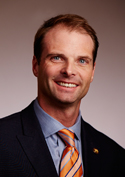
Sean T. Grambart, DPM, FACFAS
ACFAS President
I recently read that more than half of physicians in the U.S. are “burned out.” Not just stressed, but actually so stressed they’re having trouble regrouping between shifts. While this may be hard for some of us to admit or understand, the research is telling us it’s true—we are experiencing job burnout, and the reports say it’s not getting better.
According to the Mayo Clinic Proceedings, evidence is rapidly accumulating to suggest physician burnout has reached epidemic levels in the U.S. healthcare delivery system. Researchers state that 54.4 percent of physicians reported at least one symptom of burnout, a rise of almost nine percent in only three years. Physicians’ satisfaction with their work-life balance had declined from 8.5 percent in 2011 to 40.9 percent in 2014. Comparatively, the general adult population has a 28 percent burnout rate.
It’s inevitable that this crisis can lead to decreased patient satisfaction, empathy and patient compliance...not to mention malpractice and staff turnover. Yet, many doctors don’t understand the pathology, markers or how to treat their own burnout. One of the main reasons why is we often treat burnout and daily stress as the same. In reality, they are very different. Stress is something that drains you, but you are able to recover from it. Burnout is when you are drained and not able to recover between shifts.
Dike Drummond, MD, a physician coach, finds that physicians tend to use a battery metaphor to describe stress and burnout: “My batteries are run down” or “I’m recharging my batteries.” But he urges us to remember what happens when our phone battery runs out—it stops working! Surgeons don’t function like batteries.
I know we’re trained to run on empty and continue to see patients long after we are completely exhausted. Building the capacity to work despite complete exhaustion is an unfortunate outcome of our medical education and training. However, once you get out into practice, your whole life stretches out ahead of you, and there’s only so long you can practice on empty before something bad happens.
Dr. Drummond urges us to use three “Energetic Bank Accounts” to gauge our energy levels: 1. Physical Bank Account (Exhaustion); 2. Emotional Bank Account (Sarcasm, Cynicism, Blaming) and 3. Spiritual Bank Account (“What’s the use?”).
Each time you are in the clinic or operating room, you expend physical, emotional and spiritual energy. Once you become aware of the existence of the three energetic bank accounts, your job becomes very clear—Keep all three accounts in a positive balance: Physical—How is your energy? Are you in a positive balance? Emotional—How are you feeling emotionally? Are you getting your needs met in your most important relationships? Spiritual—Do you feel your work makes a difference and is a meaningful path for you?
Two ways to increase your energetic bank account are to decrease the drain and to increase the deposits. If you feel one or more of your “accounts” is out of whack, I urge you to read Dr. Drummond’s book, The Happy MD, for his sage advice. Your goal is to develop new habits that maintain a positive balance in all three accounts.
Remember more than 50 percent of us will be affected by this. So, I offer two final suggestions: 1. Reach out to colleagues whom you know who are not burned out and see how they manage their practice and lifestyle. 2. And/or, if you see a colleague who is showing signs of burnout, reach out to him or her as well.
Let’s start the New Year off with getting our Energetic Bank Accounts in balance for our families, patients and ourselves!
